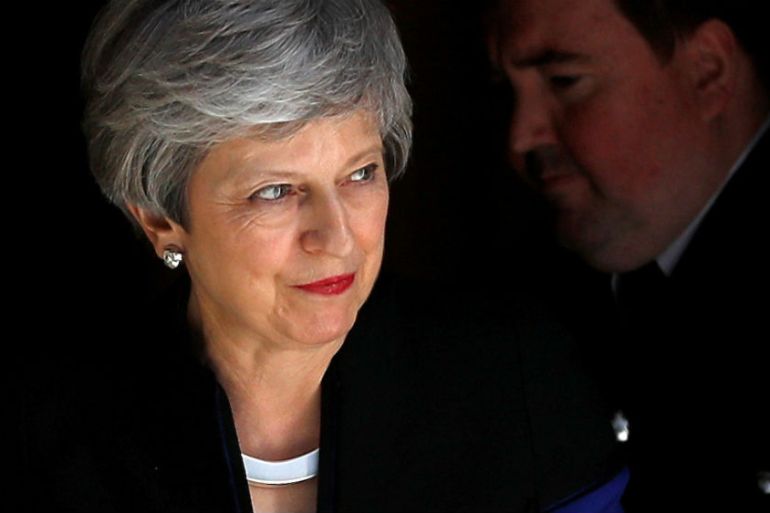Brexit breakdown: May to announce departure timeline in June
British PM will lay out her departure plans as Labour withdraws from talks, and Brexit chaos continues.

Talks between Prime Minister Theresa May and opposition leader Jeremy Corbyn have collapsed, officials revealed on Friday.
Six weeks of negotiations had aimed to unlock the Brexit impasse which has crippled British politics and led to financial uncertainty in European and global markets.
Keep reading
list of 4 itemsNorthern Ireland agreement could end deadlock, restore government
Forced to become British: How Brexit created a new European diaspora
Number of Britons regretting Brexit hits new record high: Survey
While some compromise had been possible, “we have been unable to bridge important policy gaps between us”, Labour leader Corbyn wrote to May in a letter later posted on Twitter.
“Even more crucially, the increasing weakness and instability of your government means there cannot be confidence in securing whatever might be agreed between us,” Corbyn wrote.
Theresa May, who plans to make a fourth and likely final effort to win parliamentary approval for her Brexit deal, has been laying out potential timeframes for her resignation.
She had previously told vocal opponents within her own party that she would leave office if the withdrawal agreement her administration had reached with the European Union were agreed by the House of Commons. Such a step would complete the first stage of Britain’s divorce from the EU and set it on the path she had laid out.
June departure
But discontent on Conservative backbenches forced May on Thursday to agree to set out her departure timetable in early June.
Brexit Secretary Steve Barclay blamed Labour for the breakdown of talks, saying the Conservative government had been willing to make concessions.
“There has been movement in terms of workers’ rights, there has been movement in terms of commitments on environmental standards,” he said during a visit to the Irish border.
But with the government in disarray, the issue for Labour was that any new administration would not feel obliged to stick to any agreements reached during talks with May.
“Cabinet ministers are competing to succeed you, the position of the government has become ever more unstable and its authority eroded,” Corbyn wrote to May on Friday. “Not infrequently, proposals by your negotiating team have been publicly contradicted by statements from other members of the Cabinet.”
Competition to replace Theresa May at this early stage ranges from the centre-right Jeremy Hunt to the hard-right Jacob Rees-Mogg. Yet, while replacing the prime minister may ease anger among Conservative activists, the next administration will likely face the same challenges.
“Theresa May won’t look quite so hopeless once whoever takes over confronts the same Parliamentary arithmetic, EU realities and sour national mood,” tweeted Rupert Harrison, a former chair of the UK Council of Economic Advisers.
“The Brexiteer candidates, ie Boris [Johnson] and Dominic Raab, in particular, should be very careful what they say during the campaign – temptation clearly to talk tough, but probably odds on that their first action will have to be requesting another extension from the EU.”
Widespread opposition
May’s Brexit deal had met widespread opposition. Hardline right-wing Conservative eurosceptics say it largely leaves the UK within EU structures, such as the Customs Union.
Northern Ireland’s DUP, on whose support May depends to command a majority in Parliament, says efforts to avoid a “hard border” between Northern Ireland and the Republic of Ireland – keeping Northern Ireland largely aligned with the EU until a new trade deal can be agreed, also known as the “backstop” position – undermines the integrity of the UK, creating a trade border between Northern Ireland and Great Britain.
And Corbyn’s Labour, the principal opposition party, while politically committed to leaving the EU, also opposes the deal over issues of workers’ rights and those of EU nationals living in Britain and British nationals living within the EU.
The Green Party, the Liberal Democrats, the Scottish National Party and Plaid Cymru, meanwhile, all oppose Brexit outright.
Without the full support of her own party and the DUP, May was relying on assistance from the opposition. If Labour were to abstain in the vote scheduled for the first week of June, there remained a glimmer of hope that May’s deal could pass. That glimmer has now been extinguished.
“Without significant changes, we will continue to oppose the government’s deal as we do not believe it safeguards jobs, living standards and the manufacturing industry in Britain,” Corbyn concluded.
Do whatever it takes, do it fast, find common ground and reach a solution
EU negotiators have said repeatedly that the exit deal agreed with May’s administration was the only deal on the table, and so British politicians again face a series of options on which they have previously been unable to find common ground: a “no-deal” exit, a fresh election, or a second referendum.
Another series of “indicative votes” are planned in the House of Commons in the coming weeks to see if any consensus can be reached.
“I think it is an incomprehensible error on my part that I did not intervene in the Brexit campaign owing to British wishes,” Jean-Claude Juncker, European Commission president, told reporters. “So many lies were told, so many of the consequences of a ‘no’ were misrepresented, we as a commission should have spoken up.”
Carolyn Fairbairn, the director-general of the Confederation of British Industry, made a direct appeal to the government: “Do whatever it takes, do it fast, find common ground and reach a solution. If the cross-party talks fail, move on to the next stage. If that fails, move on to something else.”